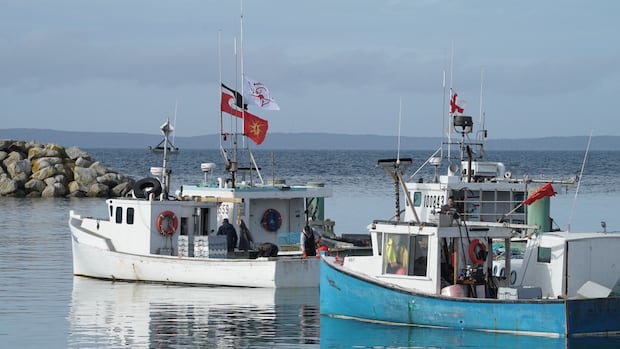Nova ScotiaA First Nation in central Nova Scotia that took the federal government to court over the contentious lobster fishery the band conducts outside the commercial season says it abandoned its lawsuit earlier this year in part due to litigation costs that had mounted to $572,073.Band cites litigation costs, progress in mediation, as reasons to discontinue suit against federal governmentMembers of the Sipekne’katik First Nation, supported by other First Nations, stand on the breakwater in Saulnierville, N.S., as non-Indigenous boats protest the launch the Mi’kmaw self-regulated fishery on Sept. 17, 2020. (Andrew Vaughan/The Canadian Press)A First Nation in central Nova Scotia that took the federal government to court over the contentious lobster fishery the band conducts outside the commercial season says it abandoned its lawsuit earlier this year in part due to litigation costs that had mounted to $572,073.The figure is contained in an affidavit from Sipekne’katik First Nation’s executive director of administration, Stuart Knockwood, filed in Nova Scotia Supreme Court last week, and which indicates the expense of pursuing the case was pulling money away from other programs. The Mi’kmaw band has asserted its members have a treaty right to earn a “moderate livelihood” by fishing for lobster outside of federal regulations and selling it, doing so in the summer and fall in St. Marys Bay in southwest Nova Scotia.The fishery has been the source of tension in the area, with opposition from the commercial sector, while Sipekne’katik has accused the federal Department of Fisheries and Oceans of seizing the traps of some band members.Filed in 2021, the suit sought a declaration from the court that the current federal Fisheries Act and regulations infringe on the treaty right to fish lobster for a moderate livelihood, a term used in 1999 by the Supreme Court of Canada in the landmark Marshall case.Sipekne’katik First Nation fishing boats are seen from the wharf in Saulnierville, N.S., on Oct. 20, 2020. (Eric Woolliscroft/CBC)In June of this year, the band discontinued its lawsuit against the federal government without explanation. However, records filed this month in court offer fresh details of the band’s reasons for dropping the legal case, noting in particular the escalating costs. “By June 2025, Sipekne’katik was reconsidering the financial trade-offs required to pursue the litigation,” Knockwood said in an affidavit. “It recognized that continuing [to] fund the treaty rights action may make it impossible for the band to provide members with skill development, develop key infrastructure, and provide programming to assist with the higher poverty rates faced by members.” Sipekne’katik launched its fishery in St. Marys Bay in 2020, although individual Mi’kmaw fishermen have for years asserted a right to a moderate livelihood lobster fishery. The Unified Fisheries Conservation Alliance (UFCA), a commercial fishing group opposed to the Sipekne’katik fishery, became an intervenor in the court case. It said in a filing this month it has incurred $612,741.25 in lawyers’ fees related to the court challenge, and argues the band should be on the hook for $400,000 of that amount.The group said in a legal brief seeking costs that it intervened in the case because it raised “issues critical to its members — including to the livelihood of non-Indigenous fishers and potential long-term conservation problems in the fishery industry.” The question of legal costs is the subject of a hearing scheduled for Friday in Nova Scotia Supreme Court in Halifax. (Robert Short/CBC)The UFCA was preparing for lengthy discoveries — the process where prospective witnesses were to be questioned — but Sipekne’katik cancelled them at the “last possible minute” and dropped the lawsuit, the brief said.The case related to costs is set to be heard Friday in Nova Scotia Supreme Court in Halifax.The band called the UFCA’s demand for $400,000 an “extreme request,” and warned in court documents that if it were granted, it would “set a precedent of the worst kind and chill future Aboriginal and treaty rights litigation in Nova Scotia.”Sipekne’katik Chief Michelle Glasgow did not respond to a request for comment. Colin Sproul, the president of the UFCA, declined to comment until the judge makes a decision on costs.Sipekne’katik’s lawsuit against the federal government was paused in June 2024, as the two sides agreed to enter into mediation. However, last December, Justice John Keith set dates for June of this year for discovery.Knockwood said by June, Sipekne’katik’s band council was “somewhat encouraged by the progress made in the mediation discussions, and this suggested that there may be a way of pursuing the treaty rights of its members, without incurring litigation costs.”He said the First Nation of about 3,000 people is “not a wealthy community.” Roughly half its members are on social assistance, he said, and the band believes a moderate livelihood fishery would provide a “modest level of income” to those who participate.Money for other programsThe band has cited the 1999 Supreme Court of Canada decision that found a Mi’kmaw fisherman, Donald Marshall Jr., had a treaty right to earn a moderate livelihood by selling eels he had caught outside the commercial season.But Sipekne’katik’s growing bill for litigation, paid to the Halifax law firm Pink Larkin, has already taken away money from some of the band’s other fisheries-related programs for youth, including trap-making and boat-safety training, Knockwood said.Among the lawyers hired by the UCFA is Alex Cameron, who was paid $86,837.50 for his work on the case, according to information filed in court by the group.Cameron is a former Nova Scotia government lawyer critical of the Supreme Court’s decision in the Marshall case. In 2016, while working for the Department of Justice, he authored a legal brief in another Sipekne’katik case that said the Crown’s obligation to consult extended only to “unconquered people.”Then premier Stephen McNeil and then justice minister Diana Whalen subsequently disavowed the comments. Cameron was removed from the file and later sued the pair for defamation, abuse of public office and constructive dismissal. The suit was settled out of court.It’s not clear where negotiations between Sipekne’katik and the federal government stand. A spokesperson for DFO said in a statement Thursday there was no agreement reached as a result of the legal action.”The department will continue to engage with Sipekne’katik to discuss the implementation of their right to fish in pursuit of a moderate livelihood during the commercial fishing season, as the department has done with other First Nation communities across Atlantic Canada and Quebec,” the statement said.ABOUT THE AUTHORRichard Cuthbertson is a journalist with CBC Nova Scotia. He can be reached at richard.cuthbertson@cbc.ca.
Sipekne’katik spent more than $500K on now-abandoned treaty rights lawsuit












